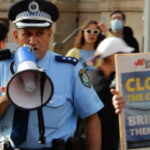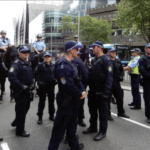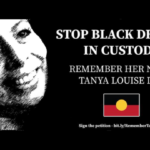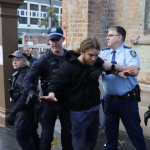Police Powers to Deal With Intoxicated Persons in New South Wales

Victoria says it will formally decriminalise public drunkenness on the 7th of November 2023, which would leave Queensland as the only jurisdiction in Australia where public intoxication remains a criminal offence.
New South Wales formally decriminalised public drunkenness way back in 1979. But, police officers in our state continue to have a number of powers when it comes to the management of individuals they consider to be intoxicated.
Here is a summary of those powers as well as the potential consequences of acting in a manner considered by police to be socially unacceptable and failing to move on when directed to do so.
Move on powers for intoxicated persons
Section 198 of the Law Enforcement (Powers and Responsibilities) Act 2002 (‘LEPRA’) provides that a police officer may give a direction to an intoxicated person in a public place to leave and not return for a specified period (up to 6 hours).
This is colloquially known as a ‘move on direction‘.
A person is ‘intoxicated’ if:
- the person’s speech, balance, co-ordination or behaviour is noticeably affected, and
- it is reasonable in the circumstances to believe that the affected speech, balance, co-ordination or behaviour is the result of the consumption of alcohol or any drug.
The officer can only give this direction if they believe on reasonable grounds that the intoxicated person’s behaviour:
- is likely to cause injury to any other person or persons, damage to property or otherwise give rise to a risk to public safety, or
- is disorderly.
The direction also must be reasonable in the circumstances for the purpose of:
- preventing injury or damage or reducing or eliminating a risk to public safety, or
- preventing the continuance of disorderly behaviour in a public place.
If a person returns to a place contrary to a move on direction they will commit an offence under section 9 of the Summary Offences Act 1988. This offence carries a maximum penalty of a fine of $1650.
Powers to detain intoxicated persons
Section 206 of LEPRA provides NSW police with the power to detain an intoxicated person found in a public place, if they are:
- behaving in a disorderly manner or in a manner likely to cause injury to the person or another person or damage to property, or
- in need of physical protection because the person is intoxicated.
The detained person may be either:
- taken to, and released into the care of, a responsible person willing immediately to undertake the care of the intoxicated person; or
- taken to an ‘authorised place of detention’, such as a police cell or youth detention centre, for purposed of sobering up.
A person must only be taken to an authorised place of detention if certain criteria are met, including that:
- it is necessary to do so temporarily for the purpose of finding a responsible person willing to undertake the care of the intoxicated person, or
- a responsible person cannot be found to take care of the intoxicated person or the intoxicated person is not willing to be released into the care of a responsible person and it is impracticable to take the intoxicated person home, or
- the intoxicated person is behaving or is likely to behave so violently that a responsible person would not be capable of taking care of and controlling the intoxicated person.
Section 207 of LEPRA also outlines certain rights that apply to intoxicated persons detained in an authorised place of detention, including that they:
- must be given a reasonable opportunity by the person in charge of that place to contact a responsible person, and
- must, as far as is reasonably practicable, be kept separately from any person detained at that place in connection with the commission or alleged commission of an offence, and
- if the intoxicated person is apparently under the age of 18 years, must, as far as is reasonably practicable, be kept separately from any person over that age detained at that place, and
- must not be detained in a cell at that place unless it is necessary to do so or unless it is impracticable to detain the person elsewhere at that place, and
- must be provided with necessary food, drink, bedding and blankets appropriate to the person’s needs, and
- must be released as soon as the person ceases to be an intoxicated person.
Surprisingly, section 210 of LEPRA states that police officers and detention officers are not liable for acts or omissions done in relation to the detainment of intoxicated persons if done in “good faith”.
Should police powers in relation to intoxicated persons be abolished?
Whilst New South Wales does not have an explicit criminal offence applying to public drunkenness, the management of public intoxication is still largely within the power of NSW police.
In contrast, Victoria’s decriminalisation of public drunkenness, avoids specific police powers in relation to the moving on and detainment of intoxicated persons. This decision was made largely on the basis that police targeting of public drunkenness has historically been shown to disproportionately impact Aboriginal and Torres Strait Islander people.
Over 30 years ago, the Royal Commission into Aboriginal Deaths in Custody recommended decriminalising public intoxication in all states and territories across Australia. Of the 99 Aboriginal deaths in custody that were investigated by the Royal Commission, 35% involved Aboriginal people who were detained in relation to public intoxication.
Recent reforms in Victoria were also informed by the tragic death in 2017 of Tanya Day, a proud Yorta Yorta woman, who died as a result of an injury sustained in a police cell following her arrest and detention for public drunkenness.
This experience, and that of many First Nations people, indicates that police (and particularly police cells) should have a much more limited role in the management of public intoxication.
The Victorian approach avoids the use of police cells by instead relying on the expansion of voluntary harm reduction services such as sobering-up centres.
A sobering-up centre is a safe places where people who are too intoxicated to look after themselves can go to recover. It’s safer than being in a police cell because there are health professionals who can provide health care if someone is sick or injured. Sobering-up centres provide something to eat, a shower, clean clothes and a laundry service.
There are beds so people can rest or sleep, usually for up to 24 hours but sometimes longer. Sobering-up centres have been proven to be effective at reducing the harms caused by alcohol including accidents, self-harm and harm to others.
The Victorian approach should spark a re-think in New South Wales regarding how the state manages encounters with intoxicated persons in public places.






